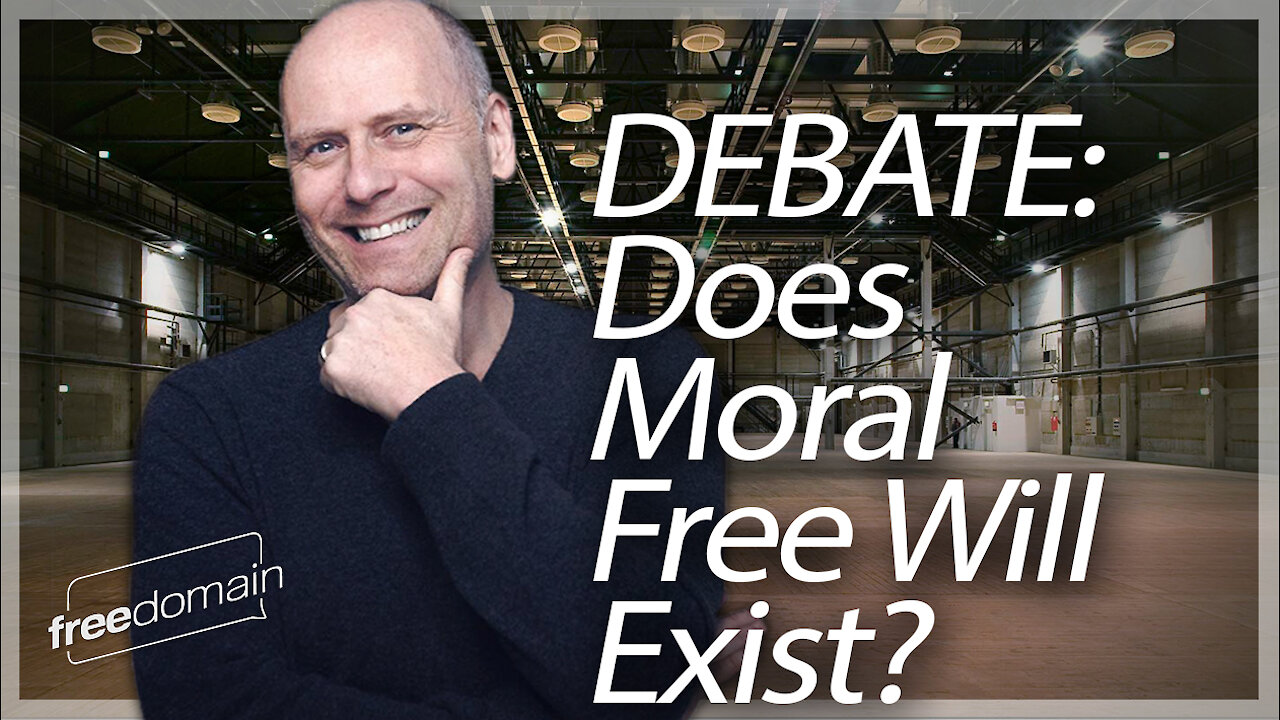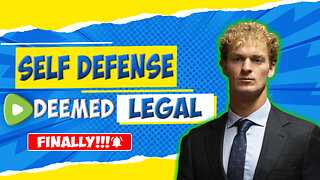Premium Only Content

DOES MORAL FREE WILL EXIST? Freedomain Debate
The follow is a Criticism of the podcast "How I forgave my mother".
5:02 “Now, why did I want to believe that she could make better choices”?
Better choices relative to what? Relative to what you might have perceived of as better. Or relative to what she perceived as better? Can an argument not be made that your mother did deliberate and arrived at a conclusion that she perceived of as better? Thus, leading to the conclusion that she was making better choices.
This standard of “better choices” is something that you criticized Ayn Rand for in her suggestion of a standard of morality being “that which promotes life”. You criticized this due to its subjectivity. What promotes life for George Bush will be radically different from that which promotes life for Afghani citizens. Thus, it would be impossible to universalize this standard. This exact criticism applies to this standard of “better choices”.
5:20 “A puppy can’t make better choices, so you don’t have to forgive the puppy for peeing on the floor. A baby can’t make better choices so you forgive the baby for peeing in your eye.”
Is it reasonable to liken the cognitive capacity of a fully grown adult woman to a baby and a puppy?
6:01 “It would be wrong to be angry at someone who can’t make choices”.
I agree. It would be wrong to get angry at someone who cannot make choices. It would be wrong to get angry at someone in a coma. It would be wrong to get angry at someone with a very severe cognitive impairment. It would be wrong to get angry at a baby. Does a fully grown adult woman fall into any of these categories?
6:22 “In a strange way it is because I wanted to stay close to her that I stayed angry at her because if I can make better choices and my mother can make better choices, then we are similar. We’re in the same category”.
Would it not be more reasonable to suggest that the categories which the two of you inhabit are that of moral and immoral? As opposed to having choice and not having choice? Since by “better” I am assuming that you mean “better” relative to the ideal of virtue.
8:20 “By the time I met her she was post free will”.
Would it not be more reasonable to suggest that by the time you met her she was post morality? That she lost the capacity to opt for the morally virtuous choice.
8:40 “By the time I met her she was a robot. By the time I met her she was post free will”.
You have related a story in which you either hit or shook her for the first time in a situation of self-defence and after this she never laid her hands on you again. Is this not indicative of someone who has the ability to be exposed to new stimuli, inculcate its meaning, deliberate and then adapt her behaviour? Wouldn’t a robot have continued to hit you and not have taken this new stimuli into consideration? By Robot do you mean that which is pre-programmed and will fulfill its programming in all situations. Or by Robot do you mean Artificial intelligence that has the ability to take in new information and adapt its protocols accordingly?
At around 10:30 you are suggesting that a 400lb woman is 400lbs because she was poorly instructed by her mother and due to these conditions, she is now incapable of playing with her children. This is a deterministic argument. Causation. Are you not the one who suggested that having a father for an alcoholic does not mean you have to be an alcoholic? You can either analyze the wreckage which alcoholism brings and choose differently, thus repudiating the father. Or you can accept the father, view alcoholism as a fact of life and in doing so recreate the abuse.
13:27 “My mother was force fed trauma, in the way that you as a child can be force fed food”.
Is your argument here that free will is contingent on the degree of trauma one experiences as a child? And that the more severe it is, the less free will and agency you have as an adult? I mention degrees because about a minute earlier you suggested that your mother experienced more trauma than yourself. You hold yourself responsible for your actions and expect others to do the same. Marilyn Manson also experienced severe trauma, however you held him responsible for his actions. Of course, Marilyn did not experience the horrors of war. Will you be creating a booklet indicating at what severity of childhood trauma that someone loses their free will (Yes, this is a troll question, but the logic you have postulated appears to lead to this conclusion)?
14:54 “My definition of free will is our capacity to compare proposed actions to ideal standards”.
Opting for immorality does not suggest that you are incapable of free will. Someone can compare a proposed action to an ideal standard and opt to not live up to that ideal. Is the rapist incapable of comparing the proposed action of rape to the ideal standard of “don’t rape people”? Or can they compare the proposed action to the ideal standard and still opt to rape?
15:09 “Did my mother have ideal standards? No. She was not religious, she never went to church, she was not philosophical, she did not have ideal standards that I know of.”
Your definition of free will does not suggest that having ideal standards is indicative of having free will. You said that being able to compare proposed actions to ideal standards is indicative of free will. Meaning that awareness of an ideal standard is sufficient. Do you need to have an ideal standard in order to make a comparison of a proposed action? Or is knowledge of the ideal sufficient to make a comparison?
14:59 “Telling the truth is good, should I tell the truth in this situation. Yes, because telling the truth is good. So you can compare your proposed actions to ideal standards. That’s your choice, that’s your free will”.
“Telling the truth is good, should I tell the truth in this situation? No, because I am not good and I don’t want to be good and I don’t care about goodness.” Would this postulation not constitute the ability to compare proposed actions to ideal standards?
15:48 “Who do you know who has ideal standards. Who do you know has moral absolutes that they must surrender to”?
Wouldn’t always surrendering to moral absolutes be indicative of a robot? Be indicative of someone who does not have free will? Wouldn’t someone who knows that they can disregard their moral beliefs at anytime but chooses to follow them anyway be someone who has free will?
17:37 “My mother had no ideal standards by which to compare her behaviour, so she had no free will”.
Are you not the one who suggests that old, wholesome television shows have been in existence for decades now and these shows showed mostly peaceful home life situations? Shows like leave it to beaver. Doesn’t this then mean that your mother had ideal standards that she could compare her behaviour to? Of course, I am assuming that she both owned a television and watched television shows. My guess is that you were born in 1965 and leave it to Beaver first aired in 1957. That’s an 8-year gap before its release and your birth. And it is also likely that clones of this program existed as well, so it was not the only one of its kind.
17:53 “So why did she have no ideal standards because she couldn’t believe in…. you know the second world war killed Christianity more than any other single thing.”
Are people who experienced the second world war or rather experienced it and suffered great trauma while they were children not responsible for their actions as adults? Because your argument here for your mother not having ideal standards and thus no free will can be applied to them as well.
22:51 “So sure my mother was aware that she would get in trouble if she beat us in public, so she didn’t beat us in public. But not because she could do better or had higher standards anymore than the thief is a better person because there is a camera blinking, and he doesn’t want to get caught”.
You have been using two distinct standards throughout this entire video to determine free will. Your argument here is that your mom does not have free will because she had no ideal standards. But your definition of free will says nothing about having higher standards. It is all about having the capacity to compare proposed actions to ideal standards. Is the murderer not responsible for their actions because they do not have the ideal standard of not murdering people? Because if we follow the logic that you are using with your mother, then this murderer is not responsible for his/her actions because they do not have this higher standard. And if they are not responsible then why are they in jail? I am universalizing your statements. Universal ethics. Are you a compatibilist now? Can people be responsible for their actions while having no free will? Should the murderer be locked up if they have no free will?
23:54 “Look at the people in your life. What practical evidence do you have that they’re capable of making choices. Moral Choices.”
When presented with a moral crossroad there are two options. You could opt for the virtuous choice or the choice of iniquity. Choosing the latter does not mean that you have not made a moral choice. You have made a choice pertaining to morality. You chose the path of iniquity. Conscious communist subverters are making moral choices all the time, they are just not making virtuous choices.
32:20 “Who do you know who has free will. And not just in some philosophical definition sense but in a practical sense. Who do you know who has genuinely taken self-ownership, apologized, improved, listened to reason, listened to evidence, changed their mind for the better according to some standard that is not merely a will to power. Who do you know who is human? Or Superhuman if the definition of human is to not have free will which statistically and democratically appears to be the case”.
What you have illustrated are not benchmarks of free will. These are benchmarks of virtue. Of a virtuous morality. Free will is not virtue. Free will is not morality. Perhaps they are related, but they are not one in the same. Taking self-ownership is not free will, that’s virtue. Listening to reason is not free will, that’s virtue. These are not standards of free will.
38:15 “I defined the methodology for free will 15 years ago. The ability to compare proposed actions to a Universal or higher standard”.
38:38 “She did not have access to, did not internalize and could not manifest any allegiance to a higher or universal standard. By my own definition of free will my mother could not have had free will”
These are two very different standards. In your original definition of free will, like I said earlier, it does not require having a higher or universal standard, but simply your ability to compare proposed actions to said standard. And in the latter statement here, you are adding that someone needs to both internalize and ally oneself to a higher universal standard. By your original definition, your mother has free will.
Unless you would like to amend your 15+ year old definition of free will from, “the ability to compare proposed actions to a universal or higher standard”, to “the ability to internalize and ally oneself to universal or higher standards and compare proposed actions to your internalized ideals”.
41:49 “So the fact of me judging my mother as morally deficient when there is no evidence that she could make moral choices at all, I’ve actually been cruel to a toddler”.
Your mother made moral choices her entire life. She did not make virtuous choices, but she made choices pertaining to morality. She hit you privately. The fact that she did not do it in public means that she knew that it was immoral. But she chose to do it anyway. Her opting to hit you is a moral choice. Just because she chose an immorality and consistently chose immoralities does not mean that she lacked choice.
42:50 “So sorry mom, she’ll never hear this. I’m sorry, I was wrong. I was wrong to blame you for something that even by my own philosophy you couldn’t control. I have gotten angry at an epileptic for knocking over my drink. I have gotten angry at gravity because I fell”.
You cannot give an epileptic a million dollars to stop their epileptic episodes. But you could have given your mother a million dollars to completely stop abusing you for a brief period and she would have said yes. These are arguments that you yourself have used in order to determine control. And it makes sense. This is your benchmark for determining control. The fact that she continued to abuse you just meant she did not have a strong enough incentive to not abuse you. But if she had one, she would have stopped. Furthermore, if you recall the episode you talked about in which she abandoned you and your brother to go fuck some guy overseas. She was given the proverbial Million dollars in the form of a free vacation to not abuse you for a brief period of time and she took it. This indicates that she has control. You have suggested that you hate theoreticals. Well, this is your argument in action. She took the Million and did not abuse you during that time. And when she fully spent the Million, she returned to abuse you.
53:39 “So as long as I was projecting my own capacity for free will and choice onto the world around me, I was frustrated. Why aren’t they doing the right thing? Because they can’t.”
Incorrect. They are not doing the right thing because they are either immoral or amoral. They do not care about doing the right thing. To say that they do not have free will/the capacity to compare a proposed action to an ideal standard is incorrect for the aforementioned reasons. Opting for an immorality, thus not doing the right thing is not indicative of a lack of free will. It is indicative of an immoral or amoral person.
Was Roman Polanski incapable of doing the right thing in not raping the 13-year-old? If he was incapable of it, then are you going to issue a statement apologizing for your indictment of him? Is the argument now that since Roman Polanski has no choice, no free will in the matter of raping the 13 year old, then we must jail him anyway in order to protect society from him? Well then this no longer becomes a matter of morality or Philosophy. But of consequentialism. Are you a consequentialist now? Are you not the one who said that it is impossible to reconcile a deterministic world view and philosophy? How do we deal with the rapist Roman Polanski if he is not responsible for the rape? If he is responsible, then that must mean that he did not meet the benchmark of being severely abused out of being able to have free will. But there must be rapists out there who have hit this degree of severe abuse and thus no longer have free will. Now how will we be able to determine which of these rapists are at this mark so we can not hold them responsible for the rape? Unless someone can both not have free will and also still be responsible for their actions. Ivory Tower.
Is it possible that both your proximity to this issue and the influx of Christians into your life is clouding your judgement on this singular issue?
-
 1:17:07
1:17:07
Freedomain
17 hours agoFREEDOMAIN FLASH LIVESTREAM @ 1pm EST!
992 -
 11:47
11:47
Jack Murphy Live
3 years agoDoes The GOP Deserve To EXIST?
1413 -
 33:25
33:25
Allie Beth Stuckey
3 years agoDoes Purgatory Exist? | Q&A | Ep 412
1693 -
 1:38:44
1:38:44
Stu Does America
3 years agoStu Does LIVE Presidential Debate Commentary
103 -
 12:19
12:19
Tundra Tactical
13 hours ago $12.62 earnedDaniel Penny Beats Charges in NYC Subway Killing
60K11 -
 29:53
29:53
MYLUNCHBREAK CHANNEL PAGE
1 day agoUnder The Necropolis - Pt 1
151K51 -
 2:00:10
2:00:10
Bare Knuckle Fighting Championship
3 days agoCountdown to BKFC on DAZN HOLLYWOOD & FREE LIVE FIGHTS!
54K3 -
 2:53:01
2:53:01
Jewels Jones Live ®
1 day agoA MAGA-NIFICENT YEAR | A Political Rendezvous - Ep. 103
146K36 -
 29:54
29:54
Michael Franzese
17 hours agoCan Trump accomplish everything he promised? Piers Morgan Article Breakdown
132K56 -
 2:08:19
2:08:19
Tactical Advisor
21 hours agoThe Vault Room Podcast 006 | Farwell 2024 New Plans for 2025
197K11